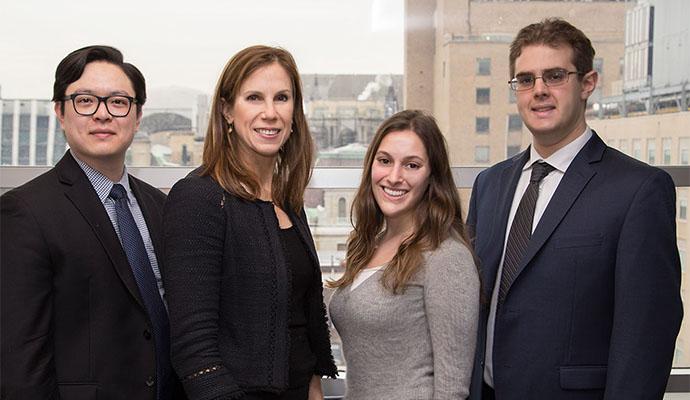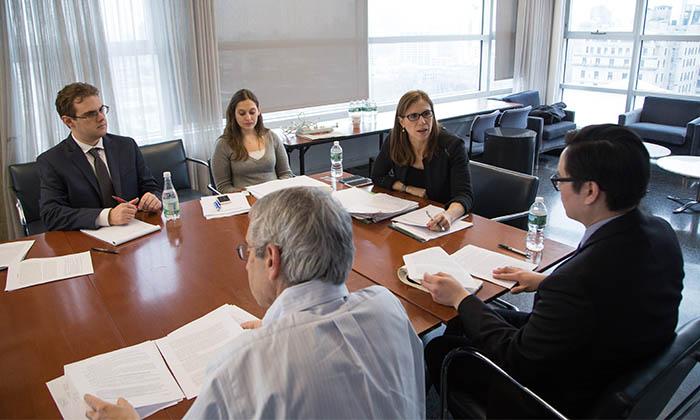Columbia Law Grads and Student Play Role in DA Fundraising Reforms
When Columbia Law’s Center for the Advancement of Public Integrity (CAPI) released its report on district attorney fundraising practices, the reaction was immediate and decisive: Manhattan DA Cyrus Vance, Jr. announced that he would no longer accept campaign contributions from attorneys with pending cases.
And the people behind that report? CAPI executive director Jennifer G. Rodgers and a trio of skilled researchers: third-year Law School student Sabrina Singer ’18, and Izaak Bruce ’17 and Jason Yee ’17, who are the inaugural recipients of CAPI’s first-ever Anti-Corruption Fellowship. “We had the opportunity to write on what’s really been an unexplored area,” Bruce said.
Rodgers, a former federal prosecutor, recruited the three to work on the project last October after Vance asked the center to conduct an independent review of his campaign fundraising practices. The request followed media reports questioning whether Vance’s charging decisions—related to Harvey Weinstein and Ivanka and Donald Trump, Jr.—were influenced by donor contributions. Singer, Bruce, and Yee were integral members of the team that prepared the report, Raising the Bar: Reducing Conflicts of Interest and Increasing Transparency in District Attorney Campaign Fundraising, released Jan. 22.
A call for more transparency
The report makes seven recommendations for ways to address actual, potential, and perceived conflicts of interest. Vance told The New York Times that he would “meet and exceed these recommendations.” His promise to reject contributions from defense attorneys with cases before him, for instance, goes beyond what the report recommended (which was to limit such contributions to $320 while a case was pending and for six months after its resolution). The report and Vance’s acceptance of its recommendations were also covered by the Associated Press, Pro Publica, and the New York Post, among other outlets.
Rodgers welcomed Vance’s decision but said legislation is needed to ensure all DAs are operating under the same standards.
“Greater transparency in how DAs conduct fundraising campaigns can only improve the public’s trust in the integrity of their elected prosecutors,” she said
For Singer, Yee, and Bruce, the project was a chance to explore long-standing interests.
After her first year at Columbia Law, Singer interned in the Public Corruption Unit of the U.S. Attorney’s Office for the Southern District of New York. She also wrote her student note on the use of special prosecutors in police misconduct cases in which district attorneys have or may have a conflict of interest.
When Rodgers approached her to work on the report, she jumped at the chance. “I have long been interested in questions of fairness and the role of prosecutors in reassuring the public that the system is working as it should be,” said Singer. “I was very eager to participate.”
Bruce and Yee, who as fellows work on CAPI’s research projects and publications in addition to collaborating with other anti-corruption scholars and practitioners, brought their own expertise. Bruce completed 50 pro bono hours with CAPI as a Columbia Law School student, and Yee had prior experience with state and local policy issues through his work as a student consultant with the Center for Public Research and Leadership directed by Professor James S. Liebman.
Digging into campaign finance ethics
Working with Rodgers as well as other student volunteers and members of CAPI’s advisory board—including Columbia Law School Professors Richard Briffault and Daniel C. Richman—Bruce, Yee, and Singer each tackled a different line of inquiry for the report. Singer researched relevant policies and practices in other jurisdictions across the country; Yee looked into campaign finance rules at the state and local level and analyzed Vance’s donor data; and Bruce reviewed conflicts of interest and professional responsibility standards.
What stood out for each of them was the relative lack of information about campaign finance ethics as applied to district attorneys.
“The vast majority of jurisdictions have not contemplated campaign finance laws to deal specifically with DAs,” Singer said. “It’s almost shocking that this is really the first comprehensive examination of what’s out there.”
Indeed, as the report points out, most district attorneys have had to “develop their own rules around accepting campaign donations, which—to the extent such rules exist at all—appear to be informal, unwritten, and unavailable to the public.”
In its recommendations, CAPI compares aspects of district attorneys’ races to two areas where conflicts of interest have been considered more explicitly: judicial elections and so-called “Doing Business” restrictions limiting the financial influence of New York City contractors.
“When a district attorney is deciding whether there’s sufficient evidence to bring a case, at that moment they’re kind of acting like a judge,” Bruce explained. Doing Business restrictions designed for lobbyists, meanwhile, could apply to defense counsel who “in some ways are expected to lobby on their clients’ behalf in front of the district attorney,” he said.
Yee said the research amplified a lesson he learned in Liebman’s Center for Public Research and Leadership seminar—“that there are no silver bullet policy solutions.”
“You need to have different solutions working in tandem to improve any given situation,” he said. “That’s reflected in our work. We’re not making one silver bullet recommendation; we make a number of recommendations that we think together can improve the situation for DAs’ elections.”
# # #
Published January 30, 2017

